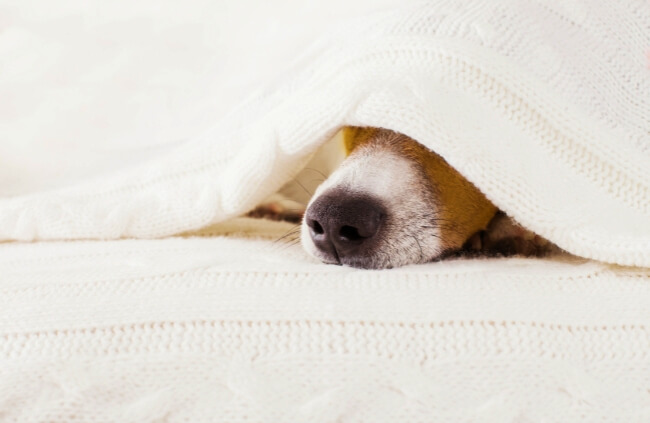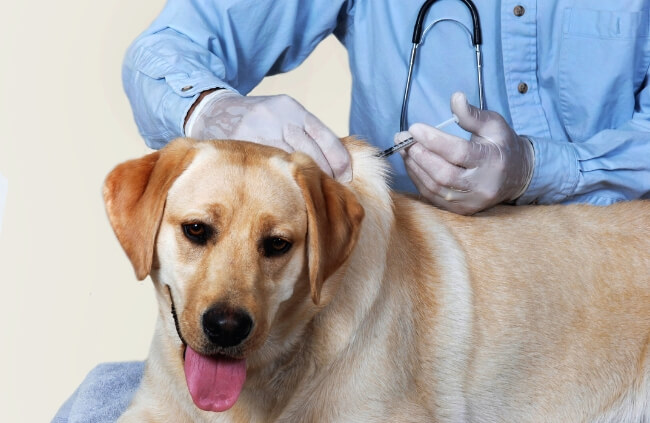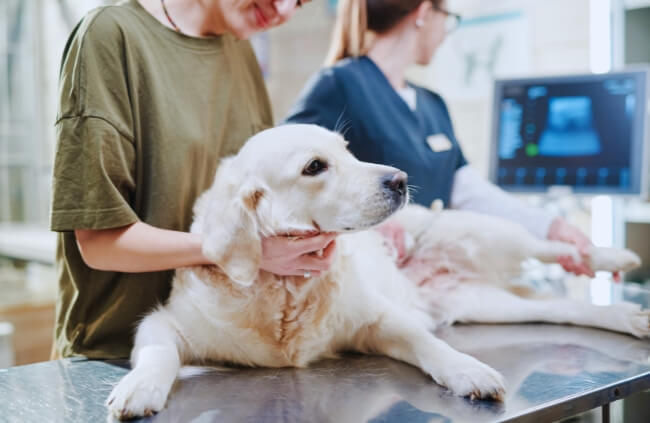Was your pup exposed to another dog with kennel cough? If so, you need to know what to do. I have gathered essential information to help you understand and manage this common canine condition. In this article, we will look at prevention methods, treatment options, and the potential risks associated with the ailment.
More...
What is Kennel Cough

Kennel cough is also known as infectious tracheobronchitis. It is a highly contagious respiratory disease that affects dogs. It starts as a relentless dry cough that sounds similar to a honking goose.
While kennel cough is usually not life-threatening, it can lead to complications. Puppies, elderly dogs, and those with weakened immune systems are more likely to have complications.
What Causes Kennel Cough?
Kennel cough can be caused by a number of bacteria and viruses. The most common culprits include the bacterium Bordetella bronchiseptica and the viruses canine parainfluenza, coronavirus, and adenovirus.
These pathogens are spread through the air and direct contact with other infected dogs. This makes environments such as kennels, grooming facilities, and dog parks prime locations for transmission.
How Common is Kennel Cough
Kennel cough is highly contagious and can be found worldwide. While the majority of cases are mild and resolve on their own, severe cases can occur. In crowded conditions, such as kennels or dog parks, outbreaks are highly possible.
This makes prevention and early detection critical in managing the spread of this common canine ailment.
The Symptoms of Kennel Cough in Dogs
Recognising the symptoms is crucial for early detection. While the most common sign is a persistent dry cough there are other symptoms to watch out for. These include:
- Sneezing
Dogs with kennel cough may experience frequent sneezing spells. These spells can further irritate their inflamed respiratory tract.
- Nasal Discharge
Keep a close eye on your dog's nose for any signs of discharge. Discharge can range from clear and watery to thick and greenish. The presence of nasal discharge indicates inflammation and a possible infection.
- Noisy Breathing
Noisy breathing is a worrying symptom of kennel cough. You may hear wheezing, rasping, or honking sounds as your dog breathes. These noises indicate airway constriction and inflammation.
If your dog is having trouble breathing, seek immediate attention from your vet.
- Fever
Just like humans, dogs often develop a fever when they have an infection. Monitor your dog's body temperature using a rectal thermometer. Do not try to take it orally.
- Lethargy
If your dog has kennel cough, it may experience a decrease in energy levels. Lethargy is a common symptom of illness in dogs.
- Loss of Appetite
A dog with kennel cough may lose interest in food. This is due to discomfort and a reduced sense of smell. Encourage your dog to stay hydrated and offer easily digestible foods.
- Fainting
Fainting is a severe symptom of kennel cough. Fainting is caused by a lack of oxygen reaching the brain. If your dog experiences fainting episodes, seek immediate veterinary care.
How to Prevent Kennel Cough

Prevention is very important when it comes to safeguarding your dog against kennel cough. Especially so when your pup has frequent interactions with other canines. By following these preventive measures, you can reduce their risk of contracting kennel cough.
Here are some preventative measures you can take to minimise the risk:
- Vaccination
Ensure your dog is up-to-date on vaccinations. Vaccination can significantly reduce the severity and duration of symptoms.
Vaccines for Bordetella bronchiseptica, Canine Adenovirus Type 2 (CAV-2), Canine Parainfluenza Virus (CPiV), Canine Distemper Virus (CDV), and both strains of canine influenza are readily available.
- Good Hygiene
Good hygiene is vital for protecting your dog from kennel cough. Regularly clean and disinfect your dog's bedding, toys, food, and water bowls. Additionally, wash your hands thoroughly after petting other dogs.
- Avoiding Crowds
If possible, you should minimise your dog's exposure to high-risk environments. These include kennels, grooming facilities, and dog parks. This is particularly important when there are known outbreaks of kennel cough.
Instead, choose play dates with known healthy dogs. Also, make sure your kennel and groomer require dogs to have all vaccines.
- Do Not Share Food and Water Bowls
In warmer weather, shop owners often place water bowls outside their establishments to keep dogs hydrated. While this gesture is appreciated, sharing bowls can spread kennel cough.
- Regular Veterinary Check-ups
Schedule routine wellness visits with your vet to monitor your dog's health. Your veterinarian can provide you with additional recommendations for preventing cough.
Diagnosing Kennel Cough in Dogs
Diagnosing involves a thorough physical examination by a veterinarian. This will often include a review of the dog's medical history and recent exposure to other dogs.
In some cases, additional tests such as blood work, radiographs, or tracheal swabs may be necessary. These are used to rule out other respiratory conditions.
Treatment of Kennel Cough

In most cases, cough will resolve on its own within 1-3 weeks. However, treatment may be necessary to alleviate symptoms and prevent complications.
Kennel Cough Treatment
Common treatment options include:
- Plenty of Rest
- Use a Humidifier
- Pet Safe Cough Suppressants
- Antibiotics
- Pain Medication
- Corticosteroids
- Prevent Hydration
- Do Not Smoke Around Them
- Offer Soft Foods
Potential Risks of Kennel Cough
While most dogs with cough do not have complications, those with severe or untreated cases can. Puppies, elderly dogs, and those with weakened immune systems can develop pneumonia.
Dogs with pre-existing respiratory conditions are at a higher risk of developing complications.
Quarantine to Prevent Transmission
If you suspect your dog has been exposed to kennel cough or is showing symptoms, isolate them from other dogs. This will help to prevent further transmission. Additionally, isolation provides your dog with time to rest and recover.
Seek Veterinary Care
If your dog exhibits any symptoms of kennel cough, seek veterinary care immediately. Prompt treatment can help prevent complications and accelerate recovery.
Keep Your Dog Healthy by Knowing How to Manage Kennel Cough in Dogs
Kennel cough is a common respiratory disease affecting dogs worldwide. With proper prevention and timely treatment, you can help your furry friend stay safe and healthy. Vaccination, good hygiene practices, and early recognition are key to preventing the spread of kennel cough.
Here's another article to help you have a healthy furry friend:
